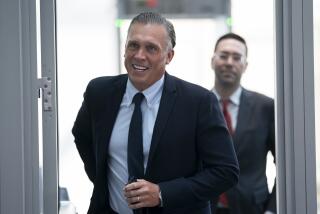GOP Bars Critics of Bush From Trade Hearing
- Share via
WASHINGTON — In what could foreshadow a platform fight at the party’s convention this summer, the Republican National Committee has barred two of the best-known critics of Bush Administration policies toward Japan from testifying Monday at a GOP committee hearing on economic and trade issues.
The two men--Clyde Prestowitz Jr., a former Ronald Reagan Administration trade negotiator, and Pat Choate, author of the book “Agents of Influence”--have argued for several years that the Reagan and Bush administrations have failed to protect American industries from unfair Japanese competition.
A spokesman for the RNC confirmed Friday that the two men, who had earlier been invited to appear at the San Diego hearing, were called this week and told not to come.
The Republicans do not want to hear from “people who are so diametrically opposed to the party’s point of view on trade policy,” said the RNC spokesman, B. J. Cooper. He noted that Prestowitz served as an adviser to leading Democrats, including former presidential candidate Paul E. Tsongas and New York Gov. Mario M. Cuomo, and that Choate had also advised Democrats.
“This is not a forum for Democratic candidates’ views,” Cooper said. He insisted that Monday’s platform hearing--the only one that will be held on trade issues before the Republican National Convention in Houston this summer--will be open to people who disagree with the Bush Administration, even if they are not as prominent as Prestowitz and Choate.
Prestowitz contended in a 1988 book, “Trading Places,” that Americans are “giving our future to Japan” by failing to protect U.S. companies in trade disputes. Choate argued in his book that Japan uses its financial clout to retain leading American opinion-makers and thus shape the outcome of Washington decision-making on economic and trade policy.
Although the RNC spokesman said he had not realized it, both men have advised the campaign of Patrick J. Buchanan, Bush’s Republican challenger, at least as much as they have helped Democratic candidates.
Buchanan has echoed some of the same claims about Japanese influence on American policy that Choate first raised in his book.
“Two days ago, I got a call at home in the evening from the RNC, asking if it was true I was an adviser to Tsongas,” Prestowitz said. “I said we did give material to Tsongas, but we also gave material to the Bush campaign, Buchanan, (Arkansas Gov. Bill) Clinton, (Iowa Sen. Tom) Harkin and everybody else. We’re not on anybody’s staff.”
Prestowitz said he had met with Buchanan in New Hampshire before that state’s primary and that he also sent material to a Bush Administration official.
The Economic Strategy Institute, the Washington think tank headed by Prestowitz, is a tax-exempt organization that is barred from political activity focusing exclusively on either of the two major parties.
The efforts by the two men to testify had been supported by Republican members of Congress concerned about trade policy, including Reps. Duncan Hunter of Coronado and Helen Delich Bentley of Maryland.
“It means that they are going to have a trade fight at the convention. That’s what this is all about,” Choate said.
Both Choate, in his writings, and Buchanan, during the Republican primaries, have criticized the Bush campaign for hiring James H. Lake as deputy chairman and communications director. Buchanan said that Lake, who has earned hundreds of thousands of dollars by representing the Japan Auto Parts Assn. since 1987, “should be wearing kimonos.”
Choate said he believed that Lake may have been responsible for barring him from the hearing. “Obviously, Jim Lake would be offended by having me there since I’ve written critically of him,” the author said.
But Cooper said that “Lake had absolutely nothing to do with any of this.”
The platform committee hearing is to be the first of four that will be held before the GOP convention to develop the party’s position on a variety of issues. The other hearings will be on energy, social issues and foreign policy.
More to Read
Get the L.A. Times Politics newsletter
Deeply reported insights into legislation, politics and policy from Sacramento, Washington and beyond. In your inbox twice per week.
You may occasionally receive promotional content from the Los Angeles Times.










